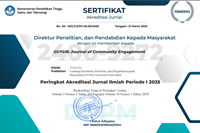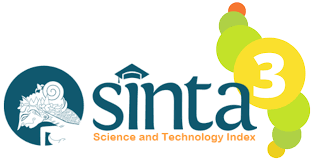Digitalization of Local Enterprises: Empowering Sewing Groups through a Modern Management System
(1) * Riska Ayu Setiawati
 (Universitas Islam Negeri Sunan Ampel Surabaya)
(Universitas Islam Negeri Sunan Ampel Surabaya) Indonesia
(2) Hapsari Wiji Utami (Universitas Islam Negeri Sunan Ampel Surabaya)
Indonesia
(3) Nurul Hidayatinnisa (Politeknik Negeri Malang)
Indonesia
(*) Corresponding Author
AbstractThis community engagement program was initiated to address the managerial limitations, low competitiveness, and dependence on conventional practices experienced by the Izzalia sewing group in Maibit Village, Tuban. The group was selected as the object of service because it represents one of the largest local sewing businesses with high potential but was hindered by limited knowledge in marketing, financial management, and supply chain organization. These conditions created an urgent need for systematic interventions to enhance their sustainability and competitiveness. The program introduced a technology-based business management system to facilitate concrete transitions: from manual bookkeeping to digital accounting applications, and from offline promotion to online marketing platforms. The main objective was to strengthen the group’s capacity and economic independence through structured training and mentoring in modern marketing, financial management, and supply chain operations. Using the Participatory Action Research (PAR) approach, the program was implemented through stages of assessment, program design, implementation, monitoring, and evaluation. Evaluation with the CIPP model (Context, Input, Process, Product) demonstrated effectiveness in the first three aspects, while refinement is still required in the product dimension, particularly the development of a raw material database. Overall, the training not only increased participants’ knowledge but also accelerated their adoption of digital accounting systems and e-commerce platforms. This transition significantly improved efficiency, expanded market reach, and reflected the group’s readiness to sustain technology-based practices. |
Keywords
Full Text: PDF
Refbacks
- There are currently no refbacks.
Copyright (c) 2025 Riska Ayu Setiawati, Hapsari Wiji Utami, Nurul Hidayatinnisa

This work is licensed under a Creative Commons Attribution-ShareAlike 4.0 International License.
This journal is licensed under

Creative Commons Attribution-ShareAlike 4.0 International License.








.png)
